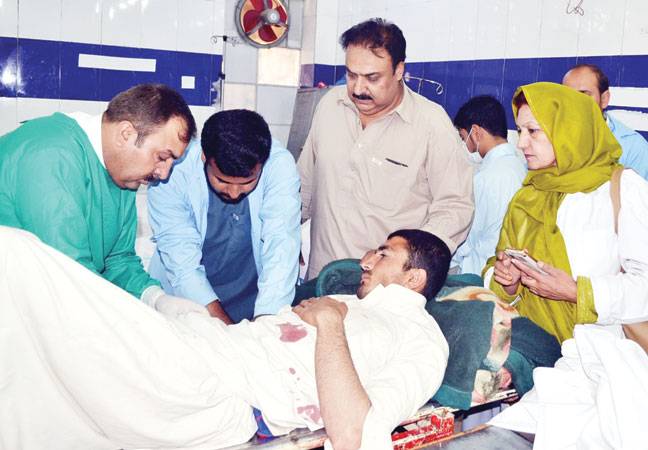Quetta - In an apparently deliberate and planned act of aggression, Afghan security forces Friday morning opened fire at Pakistani census teams near Chaman border.
The assault provoked a response from the Pakistani side, resulting in hours-long exchange of fire in which both sides also used heavy arms - killing at least 15 people, nine of them on Pakistani side.
Eight of the dead Pakistanis were civilians while one soldier of Frontier Corps were also martyred in the clash that only subsided late afternoon.
Dozens of people including security officials were also injured on both sides in the incident, which served another blow to already tense relations between the neighbours.
“So far nine patients have expired out of the 42 wounded brought to the Civil Hospital Chaman,” Medical Superintendent Dr Akhtar told The Nation.
Three women and three children were among the casualties while seven critical patients have been referred to Quetta hospitals, he said.
Other hospital sources said that four personnel of Balochistan Frontier Corps were also injured and one of them later succumbed to their wounds.
The toll on Pakistani side was much heavier because the Afghan border police reportedly had already dug up in Killi Luqman and Killi Jahangir villages, and they fired at the Pakistani census teams as well as the villagers from their secure positions.
Warning to Kabul
The census exercise was stopped in the affected border areas and all the villagers had been evacuated to safer locations, security officials said.
In a gesture of protest as well as a security precaution, Pakistani authorities shut down the Chaman gate – which leads from country’s Balochistan province into Afghanistan’s Kandahar province, and is one of only two major crossing points.
The foreign ministry also summoned Afghanistan's charge d’affaires in Islamabad to protest, calling the firing "unprovoked".
"Pakistan reserves the right to fully respond if Afghanistan fails to take measures to stop this provocation," a foreign office spokesman told a regular press briefing in Islamabad.
Pakistan Army also warned Kabul of befitting response in case it continued the policy of aggression.
In a statement Prime Minister Nawaz Sharif said it was Afghanistan's responsibility to "ensure that such incidents are permanently stopped".
The funeral prayer of martyred Sepoy Hassan Ali was offered in Quetta Garrison, said ISPR in a statement. Commander Southern Command Lt-Gen Aamir Riaz, Inspector General of Balochistan Frontier Corps Major General Nadeem Ahmed Anjum, officials and soldiers attended the funeral.
The Sepoy will be buried with full military honour, stated the ISPR.
Gen Abdul Raziq, the police chief in Afghanistan's Kandahar province, said six people — four Afghan policemen and two civilians — were killed while another 37 were wounded on their side of the border, adding he had asked his men to hold fire – unless Pakistani forces begin shooting again.
Rejection of Afghan position
Samim Khpalwak, spokesman for Kandahar governor, claimed the Pakistani census officials had strayed on to the Afghan side of the border and were attempting to count people living there.
But a press statement from military’s media wing rejected the claim, saying that Afghan border police had been "creating hurdles" for the census team in the Chaman area since April 30.
"This [aggression] was done despite the fact that Afghan authorities had been informed well in advance and coordination was carried out through diplomatic and military channels for conduct of the census," the military said.
Indirect admission of aggression
The fact that the Afghan border police committed this act of aggression under a well-thought-out plan and at the orders from Kabul was proved by a statement of Kandahar Police spokesman Zia Durani, who alleged that Pakistani officials were using the census as a cover for "malicious activities and to provoke villagers against the government".
"They did not heed the warning and we have clear orders to engage them," Durani said, clearly showing that the firing by Afghan border police was no accident.
Durand Line
The two nations are divided by the "Durand Line", a 2,400-kilometre (1,500-mile) frontier drawn by the British in 1890s and disputed by Kabul, which does not officially recognise it as an international border.
Ethnic Pashtuns living along the border have traditionally paid it little heed, with villages straddling the frontier that have mosques and houses with one door in Pakistan and another in Afghanistan.
Last year, Pakistan started building a barrier at the main border crossing in the town of Torkham, near the Khyber Pass, angering Afghanistan which rejects any efforts that could lend permanence to the Durand Line as a border.
Sour relations
Relations between the countries have been uneasy since Pakistan's independence in 1947. Afghanistan has traditionally enjoyed better ties with Pakistan's arch rival, India.
Both countries for years have also accused each other of sheltering militants on their soil that both countries allegedly use against each other as proxies.
Tension has been increasing in recent months amid new exchanges of accusations of not doing enough to tackle militants engaging in cross-border raids.






